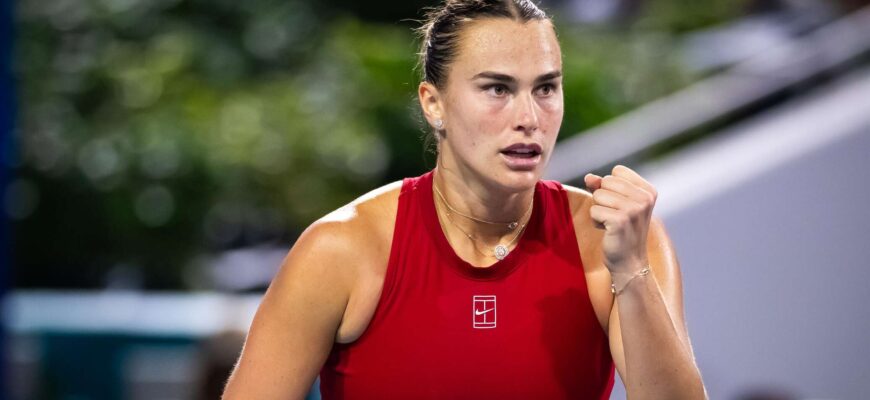Aryna Sabalenka has maintained her position as the world No. 1 for over five months and recently surpassed Madison Keys in the Race to the WTA Finals. She has reached the final in four of the six tournaments she has participated in this year, with the Miami Open final being her latest.
Is anyone capable of halting Sabalenka`s powerful momentum in women`s tennis?
Jessica Pegula is the next player to attempt to challenge Sabalenka. Pegula acknowledged Sabalenka`s strength after her own victory against Alexander Eala, stating, “Aryna, it`s another hard-court final for us. I consider myself among the top hard-court players, but she is likely the best.”
Sabalenka has been remarkably dominant at Hard Rock Stadium, consistently hitting winners. Following her victory over Jasmine Paolini, Sabalenka admitted to feeling “in the zone.”
Sabalenka is only the third woman to reach the finals of Indian Wells, Miami, and the Australian Open in the same season as the world No. 1, joining Steffi Graf (1994) and Martina Hingis (2000).
Pegula and Sabalenka have a history of eight matches, with Sabalenka winning six. How will their upcoming match unfold? Let`s examine the case for each player.
Advantage, Sabalenka
Break points are crucial moments in tennis. Against Paolini, Sabalenka demonstrated near-flawless performance on break points, saving all four against her serve and converting four out of five on Paolini`s serve.
Sabalenka`s dominance is highlighted by an example in the second set against Paolini. Down 15-40 while serving at 4-2, Sabalenka responded with three excellent serves followed by winners, showcasing her aggressive and confident style of play.
Sabalenka has only conceded 23 games across ten sets in the tournament, while Pegula has lost 44 games.
Mental fortitude, once considered Sabalenka`s weakness, may now be her greatest asset on the WTA Tour.
Pegula won their first encounter five years ago in Cincinnati, but Sabalenka has won six of their last seven matches, all in straight sets.
Martina Navratilova noted that Sabalenka appears to be an even tougher opponent now than at the US Open.
Sabalenka`s mindset is also a key factor. Despite winning 22 of 26 matches this year, her two losses in major finals, the Australian Open and Indian Wells, have been significant.
Sabalenka stated that she views losses as learning opportunities, acknowledging that sometimes opponents play with freedom and take risks, making them unpredictable.
Sabalenka feels that in previous finals, she was overly focused on her opponents rather than her own game.
With celebrity support from Bon Jovi in her semifinal, Sabalenka aims for more than just a victory; she seeks to perform better in this final compared to her previous two.
Advantage, Pegula
Could there be an element of destiny at play for Pegula?
Pegula, at 31, is the third player aged 30 or older to reach the Miami Open women`s final in recent years. Both Petra Kvitova (2023) and Danielle Collins (2024) who achieved this feat, went on to win the title.
Pegula might feel that her time to win this title has arrived.
This is Pegula`s third Miami Open semifinal appearance. In her previous attempts, she lost to Iga Swiatek (2022) and Elena Rybakina (2023). However, Pegula has consistently achieved breakthroughs in her career. After losing six major quarterfinals, she finally reached the final at the US Open last year.
Pegula seems to thrive in WTA 1000 events. This Miami final is her sixth overall. She has won three titles at this level, including Guadalajara (2022), Montreal (2023), and Toronto (2024). Winning Miami would mark her fourth consecutive year securing a title at this prestigious level.
Pegula admits she is unsure why she performs so well at these major tournaments, but is pleased it happens at WTA 1000 events. She believes she can perform well under pressure in big matches and intends to bring her best game to the final.
Pegula described Sabalenka as someone who also excels in pressure moments, indicating a tough battle ahead.
Despite expressing tiredness after her late-night semifinal win, Pegula is known for her excellent physical condition and has ample time to recover before the final.
Remarkably, this is Pegula`s third WTA 1000 final since turning 30. Since 2009, only Serena Williams and Li Na have reached more WTA 1000 finals after turning 30. Pegula is determined to capitalize on these opportunities late in her career.
Pegula could become the oldest player to defeat the world No. 1 in a WTA event final since Martina Navratilova in 1993.
Pegula believes she can bring a different approach to the final against Sabalenka and will focus on executing her game plan to capitalize on any chances.







